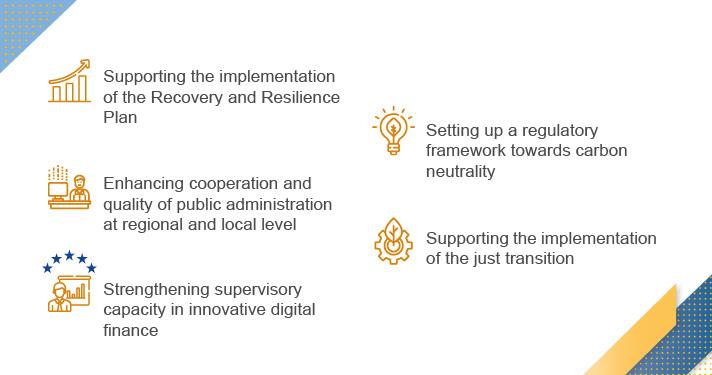The Technical Support Instrument (TSI) is the EU programme that provides tailor-made technical expertise to EU Member States to design and to implement reforms at the national level, with an emphasis on the green and digital transitions. The TSI also supports the preparation and implementation of Recovery and Resilience Plans. TSI 2022 main novelties are the multi-country projects, geared at addressing common issues among Member States thereby underlying the EU added-value of the instrument, and the "Flagship" projects, supporting reforms which are largely needed across Member States and are in line with the EU priorities.
Initiated in 2021, the TSI is the successor of the Structural Reform Support Programme (SRSP). Since 2017, both programmes have helped design, develop and implement over 1500 reform projects in 27 Member States.
10 NEW PROJECTS SELECTED UNDER TSI 2022
With the second round of the TSI, the Commission will support Czech Republic with 10 projects in the areas of General support for the Recovery and Resilience Plan (RRP), just transition, digital and ecological transformation, public administration, and digital finance banking and insurance supervision. 2 of those projects are multi-country projects.
Examples of new projects adopted include:
50 COMPLETED AND ONGOING REFORM PROJECTS
Czech Republic has so far benefited from 50 projects financed under the first cycle of the TSI and its predecessor, the Structural Reform Support Programme (SRSP). This support has addressed a broad range of policy areas including digital infrastructure, Intelligent Mobility, ‘Do No Significant Harm’ (DNSH) principle. To date, 30 projects have been successfully concluded.

The European Commission supported the Czech National Bank (CNB) in its role as the National Resolution Authority (NRA) with the preparation of a Crisis Management Manual, containing detailed resolution guidelines for financial institutions.

The European Commission supported the Czech Ministry of Health to establish a National eHealth Centre. The programme provides support with the design capacity building of the NeHC, supporting building up the governance of the eHealth ecosystem and defining a National eHealth Interoperability Framework (NeHIF) as well as testing it with one specific use case.

The European Commission supported Czech Republic in developing a new Circular Economy strategic framework, including a revision of the national waste management plan and an associated waste prevention programme.


